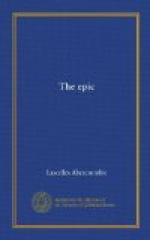An epic is not made by piecing together a set of heroic lays, adjusting their discrepancies and making them into a continuous narrative. An epic is not even a re-creation of old things; it is altogether a new creation, a new creation in terms of old things. And what else is any other poetry? The epic poet has behind him a tradition of matter and a tradition of style; and that is what every other poet has behind him too; only, for the epic poet, tradition is rather narrower, rather more strictly compelling. This must not be lost sight of. It is what the poet does with the tradition he falls in which is, artistically, the important thing. He takes a mass of confused splendours, and he makes them into something which they certainly were not before; something which, as we can clearly see by comparing epic poetry with mere epic material, the latter scarce hinted at. He makes this heap of matter into a grand design; he forces it to obey a single presiding unity of artistic purpose. Obviously, something much more potent is required for this than a fine skill in narrative and poetic ornament. Unity is not merely an external affair. There is only one thing which can master the perplexed stuff of epic material into unity; and that is, an ability to see in particular human experience some significant symbolism of man’s general destiny.
It is natural that, after the epic poet has arrived, the crude epic material in which he worked should scarcely be heard of. It could only be handed on by the minstrels themselves; and their audiences would not be likely to listen comfortably to the old piecemeal songs after they had heard the familiar events fall into the magnificent ordered pomp of the genuine epic poet. The tradition, indeed, would start afresh with him; but how the novel tradition fared as it grew old with his successors, is difficult guesswork. We can tell, however, sometimes, in what stage of the epic material’s development the great unifying epic poet occurred. Three roughly defined stages have been mentioned. Homer perhaps came when the epic material was still in its first stage of being court-poetry. Almost certainly this is when the poets of the Crusading lays, of the Song of Roland, and the Poem of the Cid, set to work. Hesiod is a clear instance of the poet who masters epic material after it has passed into popular possession; and the Nibelungenlied is thought to be made out of matter that has passed from the people back again to the courts.




